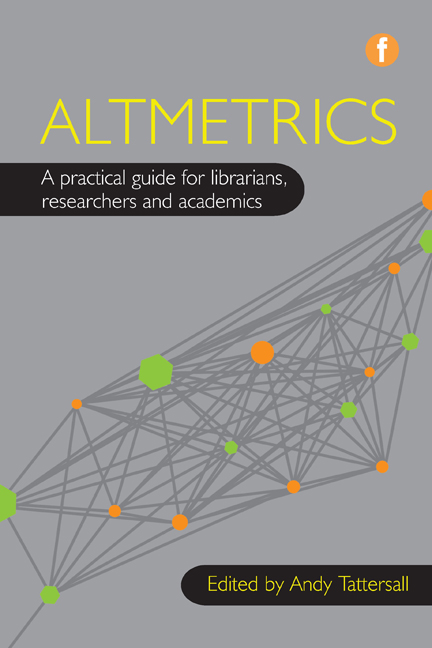Book contents
- Frontmatter
- Contents
- Contributors
- 1 Introduction
- 2 Road map: from Web 2.0 to altmetrics
- 3 ‘Metrics of the trade’: where have we come from?
- 4 The evolution of library metrics
- 5 The rise of altmetrics
- 6 Beyond bibliometrics: altmetrics reflects information about engagement with more types of scholarly content from more types of consumers
- 7 Considerations for implementing new technologies
- 8 Resources and tools
- 9 The connected academic: implementing altmetrics within your organization
- 10 Appmetrics: improving impact on the go
- 11 Open peer review
- 12 Conclusion
- Index
9 - The connected academic: implementing altmetrics within your organization
Published online by Cambridge University Press: 08 June 2018
- Frontmatter
- Contents
- Contributors
- 1 Introduction
- 2 Road map: from Web 2.0 to altmetrics
- 3 ‘Metrics of the trade’: where have we come from?
- 4 The evolution of library metrics
- 5 The rise of altmetrics
- 6 Beyond bibliometrics: altmetrics reflects information about engagement with more types of scholarly content from more types of consumers
- 7 Considerations for implementing new technologies
- 8 Resources and tools
- 9 The connected academic: implementing altmetrics within your organization
- 10 Appmetrics: improving impact on the go
- 11 Open peer review
- 12 Conclusion
- Index
Summary
Introduction
LIS professionals can experience major problems in implementing change, especially in academia. Reduced budgets are one reason for this, but the cultural fabric of their organizations and fields of practice are the principal problem. When you are trying to change organizational practice it is common to come up against a myriad of reasons why colleagues and students are reluctant to explore new ways of working. This chapter will look at the two issues facing LIS professionals in the task of providing their organizations with relevant skills and knowledge in relation to altmetrics.
Part 1 Getting the horse to water
First is the cultural and organizational resistance, usually identified at an individual level, that is built around time constraints, apathy, lack of technology awareness and absence of support. The first part of the chapter will look at different ways in which LIS professionals can engage with and encourage users to adopt a new technology or way of thinking with regard to altmetrics.
Part 2 Staying on track
The second part of the chapter will look at methods of support for instructors and academics when applying altmetrics to their work. Given that academics and students are increasingly busy with deadlines, commitments such as meetings and the growing pressure of e-mail and other information overload, it is essential not to further burden their workloads with non-essential distractions. This part will look at the issue of information and technology overload and the effects on attention span, workflow and output, and will provide a collection of solutions and methods to help those using altmetrics to do so in an effortless and streamlined way.
PART 1 GETTING THE HORSE TO WATER
LIS professionals will come across a wide range of groups and individuals as part of their role to help and support users. Those working on the front line will respond to a multitude of enquiries and requests and these interactions offer LIS professionals an ideal opportunity to build both their own and their customers’ skill sets as they are often asked to investigate a new or unsolved problem, often using technology such as social media.
- Type
- Chapter
- Information
- AltmetricsA practical guide for librarians, researchers and academics, pp. 137 - 162Publisher: FacetPrint publication year: 2016
- 1
- Cited by



